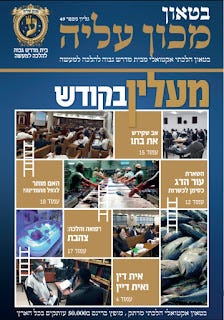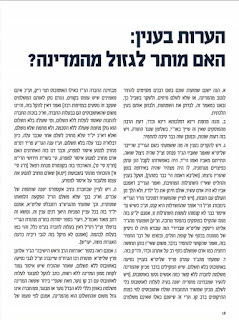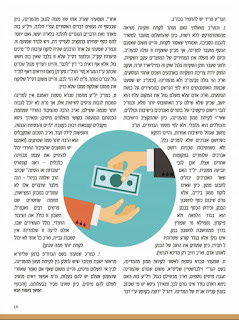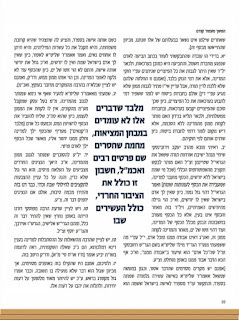Is it Permissible to Punch a Rabbi in the Face?

Is it permissible to punch a rabbi - a senior rabbi in a prestigious yeshivah - in the face?
That's the kind of thing that is going on in the Holy War at Ponevezh Yeshivah these days, between followers of Rav Kahaneman's son and followers of his son-in-law. It's actually just the latest chapter in a long-running physical battle between different factions in the Litvishe charedi world. No doubt the rabbis and yeshivah students involved in such violence have all kinds of technical pilpulim as to why their actions are not only permissible but even a mitzvah.
Still, for the rest of us, including the vast majority of charedi society, such actions are far beyond the pale. Even to ask the question "Is it permissible to punch a Rabbi in the face?" is horrendously offensive.
And yet I just came across a question that is no less problematic. It was the title of an article in a mainstream Torah journal put out by Machon Aliya, a prominent charedi organization for training people to work in various careers involving practical halacha - an organization with several branches and thousands of graduates.

"Is It Permissible To Steal From The State?" That is the title of one of the articles in this journal. And the article spends three pages engaging in pilpulei halacha regarding this question and its various applications. The good news is that the article concludes that due to the preponderance of opinions against it, it's best not to. The bad news is that the article not only raises it as a serious question, but presents numerous arguments to legitimize it, and at no point whatsoever does it stress the fundamental issue of v'asisa hayashar v'hatov, of ehrlechkeit, of the basic moral norm of being a law-abiding citizen. And this in a journal of organization dedicated to practical halacha!
The article begins by noting that according to most (charedi) halachic authorities, the principle of dina d'malchusa dina does not apply in Israel, since it is an anti-Torah government. Still, it notes that since there are those who say otherwise, there are grounds to be stringent. The next paragraph adds a story about how hishtadlus does not obligate one to engage in dishonesty. A nice point, but still missing the wood for the trees.
Then there are several paragraphs of intricate discussion about getting on the bus without paying, and about there are additional grounds to permit an adult to pay with a children's pass, and about how stealing bags from a supermarket might be permissible because (in Israel) the money for bags goes to the Environmental Protection Ministry, etc., etc.

The article then gives a different reason why stealing from the state might be problematic. No, again, it's not because it's fundamentally immoral. This one - from the famous Rav Yitzchak Zilberstein - is that if the state has less money, they are going to raise taxes, which itself is theft, and one is thereby causing the state to engage in theft! If you didn't grasp how shocking that is, read it again.
The author proceeds to note that it's not clear that such an argument would apply on an individual level, since the state will not raise taxes due to an individual taking money from it. Ah, so it won't cause the state to engage in theft, so you can engage in theft!
The article notes that based on this line of thought regarding what the state does with people's money, others argue that it is actually a mitzvah to steal from the state, since one is preventing them from using the money for anti-halachic purposes! But, the author responds, this is a poor argument - because the state might well recover its losses by cutting budgets to religious institutions rather than stopping anti-halachic programs.

Then comes perhaps the most remarkably revealing section. The article notes that according to several views, the state is not entitled al pi halacha to claim taxes, and one is therefore entitled to steal from the government to recover the taxes that were illegitimately taken. However, one is not entitled to steal back more than was originally stolen. And since, states the author, charedim receive far more in government benefits than they pay in taxes, they therefore cannot steal anything additional!
The author notes parenthetically that there are those who argue that charedim are not living off the state, but observes (correctly) that such arguments do not withstand scrutiny!
Following this extraordinary reason as to why charedim should not steal tax money back from the government (which apparently would not apply to others!), the article notes that this argument wouldn't apply to dodging paying taxes in the first place.

And so on, and so on. The article continues to discuss various other points, such as the problem with charedi MKs voting in favor of any taxes, since all taxes levied by the State of Israel are illegitimate. Until finally the article wraps up, noting briefly that since many Poskim adamantly prohibit stealing from the state, one should not rely on the minority opinions who permit it.
It's horrifying that such an article could appear anywhere. And it's appalling beyond belief that it appears in a journal put out by a prominent organization training thousands of people for positions in practical halachah. And it's simply mind-boggling that such disparagement for the state is written by someone who acknowledges that the charedi community lives off the state!
More than anything else I've seen, this perfectly encapsulates the fundamental problem with the charedi world. It's an utterly myopic approach to Torah, failing to internalize it as Toras Chaim, not even imagining how to apply it to a Jewish state with a growing religious minority. No wonder some of its members in its most prestigious yeshivah end up punching rabbis in the face.
If you'd like to subscribe to this blog via email, use the form on the right of the page, or send me an email and I will add you.


